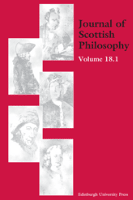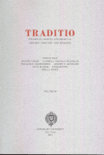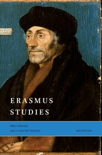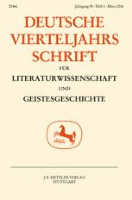
RINASCIMENTO
Scope & Guideline
Exploring the Depths of Cultural Heritage
Introduction
Aims and Scopes
- Philosophical Inquiry:
The journal explores the profound philosophical ideas of the Renaissance, particularly through the works of key figures such as Giordano Bruno, Marsilio Ficino, and Giovanni Pico della Mirandola. It examines themes like free will, predestination, and the intersections of philosophy with other disciplines. - Literary Analysis:
'RINASCIMENTO' publishes analyses of Renaissance literature, focusing on the works of poets and playwrights. The journal emphasizes the literary techniques and thematic concerns of the period, providing insights into the cultural context of the time. - Historical Contextualization:
The journal places a strong emphasis on the historical context of Renaissance thought, exploring how political, social, and religious factors influenced intellectual developments. By investigating manuscripts and lesser-known texts, it contributes to a richer understanding of the era. - Interdisciplinary Approaches:
The journal encourages interdisciplinary research that bridges philosophy, literature, history, and science. It aims to foster dialogue between these fields, thus enriching the scholarship on Renaissance studies. - Influence of Classical Texts:
A significant focus of the journal is the reception and interpretation of classical texts during the Renaissance. It examines how ancient philosophies and literatures were reinterpreted and integrated into Renaissance thought.
Trending and Emerging
- Interdisciplinary Studies of Philosophy and Religion:
There is a noticeable trend toward exploring the intersections of philosophy and religion, particularly in the works of figures like Giordano Bruno. This theme is gaining importance as scholars seek to understand the complex relationships between belief systems and philosophical thought. - Reinterpretation of Classical Texts:
The journal is increasingly publishing works that reinterpret classical texts in light of Renaissance thought. This trend underscores the significance of classical influences on Renaissance intellectuals and highlights the ongoing relevance of these texts in modern scholarship. - Gender Studies and the Role of Women:
Emerging themes include a focus on gender studies, particularly the contributions of women in the Renaissance, such as Vittoria Colonna. This shift is important for broadening the scope of Renaissance studies to include diverse perspectives and voices. - Cultural Exchange and Global Perspectives:
There is a growing interest in the cultural exchanges that occurred during the Renaissance, including interactions with non-European cultures. This theme is particularly relevant in understanding the global dimensions of Renaissance thought and its implications for modernity.
Declining or Waning
- Astrology and Medicine:
Previously, astrology and its relationship with medicine were significant topics within Renaissance studies. However, recent publications indicate a waning interest in this intersection, suggesting a shift toward more philosophical and literary analyses. - Alchemical Practices:
The exploration of alchemical themes, which were once central to discussions of Renaissance thought, seems to be diminishing. This decline may reflect a broader scholarly move away from esoteric practices towards more established philosophical discourses. - Political Philosophy:
While political philosophy was a robust area of inquiry, especially concerning figures like Machiavelli, recent papers show a decrease in focus on this theme. This may indicate a shift towards more individualistic philosophical concerns rather than collective political ideologies. - Renaissance Humanism:
The traditional focus on Renaissance humanism as a singular movement is becoming less prominent. Current scholarship appears to be diversifying into more nuanced and specific areas of inquiry, rather than treating humanism as a monolithic concept.
Similar Journals

Antichthon
Engaging Minds with the Legacy of AntiquityAntichthon, published by Cambridge University Press, stands as a vital platform within the field of Classics. Established in 1986, the journal has evolved to encompass scholarly contributions that explore various dimensions of classical studies, including literature, history, and cultural studies. With its rich publication history extending from 2011 to 2023, Antichthon boasts a commendable Q2 ranking in the latest 2023 Category Quartiles for Classics, reflecting its significant impact in the academic community. Although the journal does not offer an Open Access option, it continues to engage researchers and academics with its curated selection of articles, reviews, and critical insights. Located at the Edinburgh Building, Shaftesbury Rd, Cambridge, England, this journal remains an essential resource for both established scholars and students aiming to deepen their understanding of classical antiquity and its enduring relevance.

ZEITSCHRIFT FUR RELIGIONS-UND GEISTESGESCHICHTE
Unveiling the Tapestry of Human Experience Through Religion and ThoughtZEITSCHRIFT FUR RELIGIONS-UND GEISTESGESCHICHTE is a prominent academic journal published by BRILL, focusing on the intricacies of religious and intellectual history. Since its inception in 1929, this journal has provided a key platform for scholarly discourse, offering insights into the historical evolution of religious beliefs and philosophical thought. Although it currently holds a Q4 ranking in the fields of History, Philosophy, and Religious Studies according to the 2023 category quartiles, it serves as an important resource for researchers and students alike who are engaged in these disciplines. With an ISSN of 0044-3441, the journal strives to foster academic dialogue and critical analysis, contributing to the understanding of how religious and philosophical ideologies shape human experience. The journal is based in Leiden, Netherlands, and while it does not currently offer open access, it supports the academic community by providing essential research articles that are invaluable for those exploring the intersections of faith, culture, and thought.

CLIO-A JOURNAL OF LITERATURE HISTORY AND THE PHILOSOPHY OF HISTORY
Bridging Disciplines: Where Literature Meets PhilosophyCLIO: A Journal of Literature, History, and the Philosophy of History, published by Indiana University-Purdue University, serves as a pivotal platform for scholars and students alike. Since its inception, this journal has offered a unique convergence of literary analysis, historical context, and philosophical inquiry, creating a rich dialogue across disciplines. With an ISSN of 0884-2043, CLIO has evolved alongside the academic landscape from its early days in the late 20th century, reflecting the changing paradigms of literature, history, and philosophical thought. Although currently categorized in the Q4 quartile across its three relevant fields—History, Literature and Literary Theory, and Philosophy—it continues to invite contributions that challenge traditional boundaries and foster interdisciplinary research. While not currently an Open Access journal, CLIO remains an essential resource for those invested in the critical exploration of historical narratives and literary expressions, appealing to all who seek to understand the intricate weave between past and present.

Journal of Scottish Philosophy
Advancing Cultural Discourse through PhilosophyWelcome to the Journal of Scottish Philosophy, a renowned platform for scholarship in the fields of Cultural Studies, History, and Philosophy, published by Edinburgh University Press. With its impactful contributions since 2003, this journal proudly holds a prestigious Q1 ranking in all three categories as of 2023, reflecting its commitment to advancing critical discussions in Scottish philosophical thought and its broader cultural contexts. The journal engages a diverse readership by providing rigorously peer-reviewed research, innovative insights, and theoretical advancements that explore the rich tapestry of Scotland's intellectual heritage. Without the restrictions of open access, the journal remains a pivotal resource for researchers, professionals, and students eager to delve into the complexities of Scottish philosophy, fostering a vibrant dialogue across disciplines. Interested authors can contribute their manuscripts to join the distinguished ranks of works featured in this esteemed publication.

TRADITIO-STUDIES IN ANCIENT AND MEDIEVAL HISTORY THOUGHT AND RELIGION
Illuminating the Intersection of History, Philosophy, and ReligionTRADITIO - Studies in Ancient and Medieval History, Thought and Religion is a distinguished academic journal published by Cambridge University Press, dedicated to the exploration and analysis of historical, philosophical, and religious narratives from ancient and medieval periods. The journal's ISSN is 0362-1529 and its E-ISSN is 2166-5508. Renowned for its rigorous scholarship, it enjoys a notable standing in the academic community, reflected in its 2023 category quartiles which place it in the second and third tiers across critical fields such as Literature and Literary Theory, Philosophy, Religious Studies, and Visual Arts and Performing Arts. With its comprehensive scope that encompasses multidisciplinary approaches, TRADITIO provides an essential platform for researchers, academics, and students alike to engage deeply with the complexities of historical thought and cultural practices. Although the journal operates within the traditional subscription model, its significance is underscored by impressive Scopus rankings, indicating its high visibility and impact within the arts and humanities sectors. We invite you to discover the richness of ancient and medieval studies through the pages of TRADITIO.

Dirasat Hispanicas-Revista Tunecina de Estudios Hispanicos
Unveiling New Perspectives in Hispanic StudiesDirasat Hispanicas-Revista Tunecina de Estudios Hispanicos is a pivotal academic journal published by UNIV TUNIS MANAR, INST SUPERIEUR SCIENCES HUMAINES TUNIS, dedicated to the exploration and analysis of Hispanic studies within the broader context of history, linguistics, and literature. Established in Tunisia, this journal has transitioned to an Open Access model since 2014, promoting the dissemination of knowledge and fostering scholarly exchange among researchers, professionals, and students globally. With its ISSN 2286-5977 and esteemed recognition in various categories, including Q4 in History and Linguistics and Q3 in Literature and Literary Theory, Dirasat Hispanicas strives to bridge gaps in Hispanic scholarship by inviting diverse critical perspectives and innovative research. While its Scopus rankings reflect an evolving presence in the academic landscape, the journal remains committed to enhancing the visibility and impact of Hispanic studies. The journal continues to encourage submissions that contribute to its mission of intellectual advancement, making it an essential resource for those engaged in the rich tapestry of Hispanic cultural and linguistic heritage.

BIBLIOTHEQUE D HUMANISME ET RENAISSANCE
Illuminating the Renaissance: A Journey Through Humanism.BIBLIOTHEQUE D HUMANISME ET RENAISSANCE is a prestigious academic journal that delves into the rich fields of humanism and Renaissance studies, providing a platform for scholarly discourse and critical analysis. Published by LIBRAIRIE DROZ SA, this journal has carved a niche for itself in the study of literature, philosophy, history, and culture during one of the most transformative periods in European history. Though currently not listed as Open Access, its rigorous peer-review process ensures that published articles meet the highest academic standards, making it an invaluable resource for researchers, professionals, and students alike. While it has experienced some fluctuations in coverage over the years, spanning various intervals since its inception in the 1970s, it continues to contribute significantly to the intellectual landscape of Renaissance studies. As scholars seek to understand the complexities of human thought and artistic expression from this vibrant era, BIBLIOTHEQUE D HUMANISME ET RENAISSANCE stands out as a vital repository of knowledge and insights.

Erasmus Studies
Exploring the Renaissance: Unveiling Erasmus' Enduring LegacyErasmus Studies, published by BRILL, is a notable journal dedicated to the interdisciplinary exploration of historical and philosophical perspectives, primarily focusing on the life and works of Erasmus of Rotterdam and their impact through the ages. With an ISSN of 0276-2854 and an E-ISSN of 1874-9275, this journal serves as a critical resource for researchers and scholars in the fields of History and Philosophy, currently classified as Q4 in both categories for the year 2023. The journal's publication history spans from 1981 to the present, highlighting its long-standing commitment to academic discourse. Located in the Netherlands, at PLANTIJNSTRAAT 2, P O BOX 9000, 2300 PA LEIDEN, Erasmus Studies provides a platform for original research, comprehensive reviews, and scholarly discussions that foster a deeper understanding of the intellectual currents shaped by Erasmus and his contemporaries. Although it does not currently offer open access, it remains an essential tool for academics seeking to engage with the rich nuances of Renaissance thought and its ongoing relevance in today's philosophical landscape.

Early Science and Medicine
Charting the Evolution of Medical Thought Through TimeEarly Science and Medicine is a renowned academic journal published by BRILL, dedicated to exploring the intersections between historical and medical studies. With a distinguished history since its inception in 1996, the journal caters to an interdisciplinary audience, encompassing vital aspects of History, History and Philosophy of Science, and Medicine. It enjoys commendable rankings, being in the Q2 quartile in History, among others, reflecting its significant contribution to these fields. The journal's editorial commitments aim to advance scholarly discussions on the development of medical practices, theories, and their historical contexts, making it an essential resource for researchers, professionals, and students alike. Although currently not open access, Early Science and Medicine offers comprehensive analyses and rich content that engage with and enrich our understanding of the complex relationship between science and medicine throughout history. For more information, you can find the journal at its esteemed address in Leiden, Netherlands.

DEUTSCHE VIERTELJAHRSSCHRIFT FUR LITERATURWISSENSCHAFT UND GEISTESGESCHICHTE
Cultivating Knowledge in Literature and Philosophy.DEUTSCHE VIERTELJAHRSSCHRIFT FUR LITERATURWISSENSCHAFT UND GEISTESGESCHICHTE, published by J B METZLER, is a distinguished academic journal hailing from Germany that offers a profound exploration of literature, cultural studies, and philosophy. With its ISSN 0012-0936 and E-ISSN 2365-9521, this journal has been operational since its inception in 1973, continually contributing to the intellectual discourse surrounding literary and philosophical theories. The journal holds a recognized position within the academic landscape, achieving a Q3 ranking in Literature and Literary Theory and Q4 in both Cultural Studies and Philosophy as of 2023. Although it does not currently offer Open Access options, its impact in the field is underscored by its ranking in Scopus, where it is recognized amongst a competitive cohort of journals. Aimed at researchers, professionals, and students alike, the DEUTSCHE VIERTELJAHRSSCHRIFT serves as an invaluable resource for those investigating the intersections of literature and the broader cultural milieu, fostering an understanding of the dynamics that shape literary and philosophical thought.